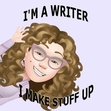🎬 Writing Lessons from Summer Blockbusters: What Explosions Can Teach Us About Emotion

Every summer, theaters fill with spectacle: heroes rise, worlds end, love survives. And while these blockbusters often lean into scale—explosions, chase scenes, dramatic monologues—they also reveal timeless truths about storytelling. Even the loudest films whisper lessons to the sensitive creator.
Here are five writing lessons you can borrow from the silver screen, no popcorn required.
 1. Start with a Bang (or a Question)
1. Start with a Bang (or a Question)Blockbusters rarely tiptoe in. They open with tension, mystery, or movement—a spaceship crash, a heist gone wrong, a character running from something unseen. You don’t need explosions, but you do need momentum.
Writing Tip: Begin your story with emotional velocity. A question, a longing, a disruption. What’s the ache that sets your character in motion?
Ritual idea: Light a candle and write the first line of your story as if it were the opening scene of a film. What would make someone lean in?
 2. Archetypes Are Invitations
2. Archetypes Are InvitationsFrom the reluctant hero to the wise mentor, blockbusters thrive on archetypes. These aren’t clichés—they’re emotional anchors. They help readers recognize themselves in the story.
Writing Tip: Use archetypes as scaffolding, then layer in nuance. What does your “villain” fear? What secret does your “hero” hide?
Sigil prompt: Create a symbol for your main character’s hidden truth. Place it on your altar as you write.
 3. Stakes Matter (Even If They’re Quiet)
3. Stakes Matter (Even If They’re Quiet)In summer films, the stakes are often global—save the planet, stop the virus, defeat the empire. But emotional stakes are just as powerful. What does your character stand to lose if they don’t change?
Writing Tip: Ask: What’s at risk emotionally? What belief, relationship, or identity is on the line?
Journaling prompt: “If my character fails, what part of them breaks?”
 4. Spectacle Serves Emotion
4. Spectacle Serves EmotionThe best blockbusters use spectacle to amplify feeling. A slow-motion fall isn’t just visual—it’s grief. A final battle isn’t just action—it’s transformation.
Writing Tip: Use sensory detail to heighten emotional beats. Let the environment echo the inner world.
Visual ritual: Create a mood board for your story’s climax. What colors, textures, or sounds surround the moment of change?
 5. End with Resonance, Not Just Resolution
5. End with Resonance, Not Just ResolutionBlockbusters often end with a return to peace—but the best ones leave a lingering feeling. A question. A shift. A scar.
Writing Tip: Let your ending echo. What has changed? What remains? What truth was uncovered?
Closing ritual: Write a letter from your character to themselves, post-transformation. What do they now understand?
 Final Scene: Your Story Is Worthy of the Spotlight
Final Scene: Your Story Is Worthy of the SpotlightYou don’t need a billion-dollar budget to write something epic. You just need emotional clarity, archetypal depth, and a willingness to let your characters feel fully. Whether you’re writing dreamy rituals or gritty dialogue, the lessons of summer blockbusters can help you craft stories that shimmer—and stay.
May your words rise like mist and strike like lightning.
May your stories be both sanctuary and spectacle.



